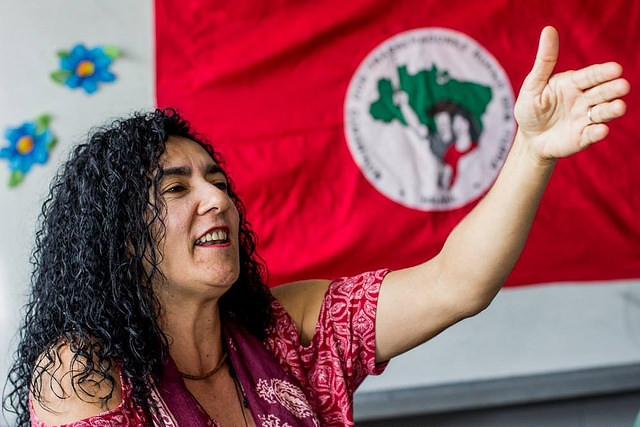Marina dos Santos: Mourning for Marielle Will Continue as Struggle
 ByLeonardo Fernandes
ByLeonardo Fernandes
from Brasil de Fato
Last Thursday, March 15, agrarian reform activists joined the mobilization in multiple cities across Brazil to condemn the murder of Marielle Franco (Psol), Rio de Janeiro city councilor, and of her driver Anderson Gomes. The impact of Marielle’s execution was covered in the national and international media. They highlighted the councilor’s work on human rights violations in the favelas of Rio.
Marina Santos, a resident of Rio and a national leader of the Landless Workers’ Movement (MST), in an interview with Brasil de Fato, talks about the strong national upheaval generated by the brutal crime against the councilwoman, and she issues a call to action over the death of Marielle to become fuel for the cause.
Brasil de Fato: Marina, it has been many years since the people of Brazil have gone through such trying times as they did last Thursday with the assassination of Councillor Marielle Franco and her driver Anderson Gomes. What is the message being relayed by the people with these actions for the country?
Marina dos Santos: Yesterday was a day of collective indignation. Activists from social movements, partisans and unions went to the streets to protest, to show their support and to demand punitive actions from the state for those responsible for the brutal acts that took place in Rio de Janeiro. This demonstrated for Brazil and for the world that they tried to steal a voice, they tried to silence the unity of the left, not only of Marielle. However, the unions and advocates of the grassroots movements made a strong statement on the streets saying: you mess around with her, you mess around with all of us.
Do you believe that the protesters, besides their indignation for the death of the city councilwoman, were also dissatisfied with the government policies mainly on public security?
The demonstrations also reflect the dissatisfaction with the policies of the new government, be it with the military intervention in Rio de Janeiro or the lack of public policies that actually address social inequality and criminality. I think the demonstrations on the 15th made it clear that the people, the society, and the country do not agree with the military intervention in Rio de Janeiro and that, contrary to what the federal government believes, the military intervention encourages criminalization of poverty and violence against the poor and the black, especially in the favelas. I think we need employment policies, an improvement of the minimum wage and education for the urban youth. We must combat crime and violence, not with policies, and not with a military intervention that in fact, only strengthens this process of criminalizing poverty.
How do you believe it possible to overcome the violence against social activists, which also affects the MST?
Clearly, the case of Marielle and Anderson would fit into the process of violence and criminalization of leaderships of popular movements, as has happened to the landless workers. In Brazil, only in this post-war period, there were more than a hundred murders of peasants and indigenous leaders in Pará. We will only overcome this with profound structural reforms, such as the implementation of a popular agrarian reform, with an urban reform, with the tax reform, by fighting the monopolies of the mainstream media. And for this reason, we hope that the people will actually take the streets and promote all kinds of struggles that will help to overcome this difficult moment that Brazil is experiencing. That we fight the unjust policies against the working class and that we have a true peace, especially in the great urban centers and the favelas of the country.
Has the violence actually worsened with the coup d'état in 2016?
Of course. And this brutal, cowardly murder of Marielle and her driver shows the face of the institutional coup that Brazil has recently experienced, the fragility of our democracy. It is a crime that reveals the barbarous and shameful situation that our country is going through.The case of Marielle gained a strong national and international recognition. What outcomes can we expect from these mobilizations?
In several countries of the world, there were demonstrations in which the Brazilian state was accused. It is very difficult that the price of the struggle is the life of Marielle and that so many poor youth die every day in Brazil. But I believe that the mourning for Marielle will continue to be a struggle. There is everything for this national upheaval to become a great movement: to take the streets, for the popular struggles to rise, and for the working class to rise up. To be moved with indignation and to show your indignation with such injustice against the Brazilian working class, this is perhaps the challenge that we are facing now. We need to overcome the fragmentation within the left and to unite against the coup, against the wave of government misdeeds that imply a strong withdrawal of workers' rights. I think the bloodshed of this young activist, cruelly and cowardly murdered, can provide unity to social movements, to all political parties, to the union movement, and finally to the Brazilian working class.
